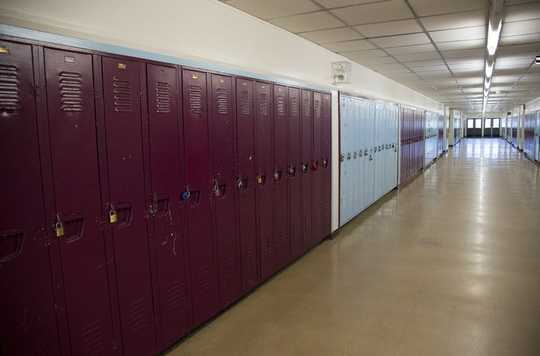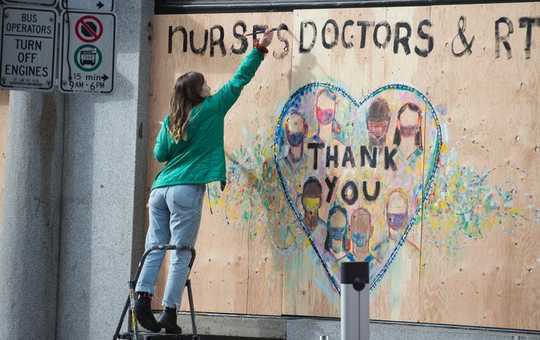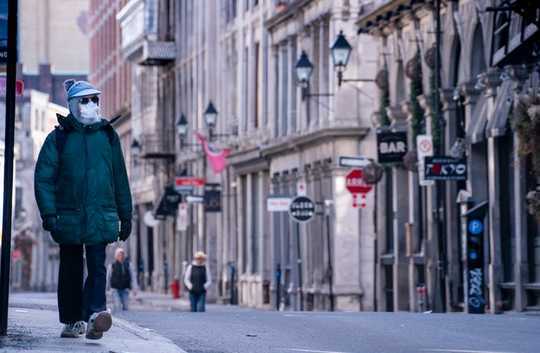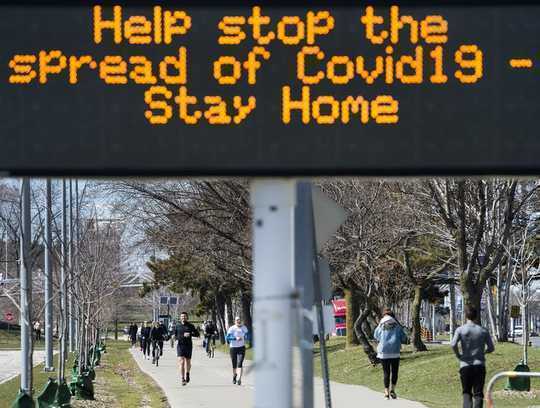 School’s out for … how long? An empty hallway at Eric Hamber Secondary School in Vancouver, B.C. THE CANADIAN PRESS/Jonathan Hayward
School’s out for … how long? An empty hallway at Eric Hamber Secondary School in Vancouver, B.C. THE CANADIAN PRESS/Jonathan Hayward
The global number of confirmed COVID-19 cases surpassed one million in early April, nearly doubling in a week. Instead of lifting or relaxing guidelines on physical distancing, we’re seeing playgrounds cordoned off and school closures extended in an attempt to flatten the curve and lessen the load on the health-care system.
As people hunker down at home, questions remain about COVID-19 infection, transmission, treatment and recovery. Here are answers to some of the common questions people are asking about the coronavirus pandemic.
Should I wear a mask?
Currently, the accepted science is that wearing masks is best preserved for front-line health-care workers. In other parts of the world, it is more common for the general public to wear masks, but evidence for their utility remains inconclusive.
In general, a mask protects the wearer, such as a health-care worker, from becoming infected. When someone wears a mask in public, it is usually to protect others from getting sick should they cough or sneeze. During the COVID-19 pandemic, people who are sick should be self-isolating at home and not venturing into public.
Get The Latest By Email
 A woman paints a thank you message to nurses and doctors on a boarded up shop in downtown Vancouver, B.C., on April 1, 2020. THE CANADIAN PRESS/Jonathan Hayward
A woman paints a thank you message to nurses and doctors on a boarded up shop in downtown Vancouver, B.C., on April 1, 2020. THE CANADIAN PRESS/Jonathan Hayward
It’s in our best interest to continue the provincial and federal efforts to preserve personal protective equipment, including masks, for the people who most need them: health-care workers and their patients.
Many people are crafting their own masks made from cotton at home. It may well become a new cultural norm for North Americans to wear masks. There is nothing harmful about this practice, as long as it does not become an excuse for a person who is sick to go out in public.
The safest and healthiest way to prevent the spread of COVID-19 remains staying home when you are sick, maintaining physical distances of at least two metres from others, not meeting in groups and cleaning your hands often.
How long can you have the virus before you show symptoms?
Most estimates for this “incubation period” range from one to 14 days, with five days being common.
People who are infected with the coronavirus are thought to be the most infectious when they are showing the most symptoms. But infection and transmission can sometimes occur when a person has the virus but doesn’t have any symptoms (they are asymptomatic).
These people can unknowingly spread the coronavirus to other people because they don’t realize they are infected. This is why it is important to stay home and keep up with social distancing — limiting the number of people you come into close contact with. It works, and it can help protect vulnerable people in our communities.
Is there a test to tell me if I’ve already had COVID-19?
When someone is infected with a virus, their immune system begins producing antibodies to that virus. A test that looks for coronavirus-specific antibodies could determine if someone has already had COVID-19, and it could help scientists understand how widespread the disease is.
The U.S. Food and Drug Administration authorized the first antibody test for COVID-19 on April 1. We don’t have this test in Canada yet.
Many academic laboratories and medical companies around the world are working to produce these blood tests. They would be able to quickly identify antibodies in people who have already been infected with the virus, but experienced no symptoms or only very mild ones.
Can someone who has recovered from the virus still be a host?
This remains unclear. There are a small number of people who have been diagnosed with COVID-19, stopped showing symptoms, had two consecutive negative test results two days apart and been discharged from the hospital, but have subsequently tested positive for the infection again.
This suggests that some patients who have recovered may still be contagious, but this must still be confirmed.
 A man wearing a mask walks along a near-deserted street in Old Montréal on March 31, 2020. THE CANADIAN PRESS/Paul Chiasson
A man wearing a mask walks along a near-deserted street in Old Montréal on March 31, 2020. THE CANADIAN PRESS/Paul Chiasson
Generally, the “viral load” — a measure of how much virus the body is carrying — gradually decreases over time after symptoms have resolved. But in some cases, the virus’s genetic material (RNA) can be detected in people for three weeks or more since their symptoms first appeared.
The levels of viral RNA detected in these studies were low and likely represented remnants of viral RNA, not live virus. But we still don’t have enough evidence yet to confirm this.
Can you get COVID-19 more than once?
Even mild cases should leave recovered patients with some immunity against the virus. But some patients have reported being infected a second time and showing symptoms again.
In one study of 55 patients in China, reactivation occurred in nine per cent of them. The clinical characteristics of these patients were no different from first-time COVID-19 patients. The study didn’t identify any reliable markers that would allow doctors to predict the reactivation risk of the SARS-CoV-2 coronavirus.
Can COVID-19 survivors’ blood help others recover?
When people recover from an illness, their blood plasma remains rich with the antibodies that helped fight off that disease. This “convalescent plasma” has been used as a treatment, called passive antigenic therapy, for other people who become ill with the same disease.
This approach was used as an emergency measure during the SARS outbreak in 2003 and for people with Ebola in 1995, but it is not used as a standard treatment.
At this time, the use of convalescent plasma to treat critically ill adults with COVID-19 is not recommended, largely because there aren’t enough data yet to show that it is safe and that it works. These recommendations could change with more data and studies.
How long might school and business closures last?
“Flatten the curve” has become a global rallying cry. Epidemiologists are working extremely hard to model various scenarios for our governments to predict the course of the disease. This could tell us if — and when — we can relax the restrictions and other strategies implemented in March.
In Canada, the number of cases we see in the first weeks of April, and the severity of these cases, will give us an indication of the impact travel restrictions and social distancing measures have made. With concrete numbers in hand, epidemiologists can adjust and refine models to better understand how long our schools and businesses will remain closed.
 People exercise near Lake Ontario in Toronto on April 2, 2020. THE CANADIAN PRESS/Nathan Denette
People exercise near Lake Ontario in Toronto on April 2, 2020. THE CANADIAN PRESS/Nathan Denette
A recent report predicts the demand for ICU beds for patients with COVID-19 may peak in early to mid-April in Ontario. This means we should keep up with physical distancing — and strict isolation for all those confirmed or suspected of having COVID-19 — for at least another few weeks. This is why Ontario extended its emergency declaration and schools remain closed until May 4.
We know these emergency health measures have social and economic impacts on our communities. Tedros Adhanom Ghebreyesus, the director-general of the World Health Organization, offered some encouraging remarks as he closed the March 30 media briefing:
“With solidarity, humility and assuming the best of each other, we can — and will — overcome this together.”
About The Author
Kieran Moore, Professor, Departments of Emergency and Family Medicine, Queen's University, Ontario. Suzanne Biro from Kingston, Frontenac and Lennox & Addington Public Health co-authored this story.
This article is republished from The Conversation under a Creative Commons license. Read the original article.
books_health







